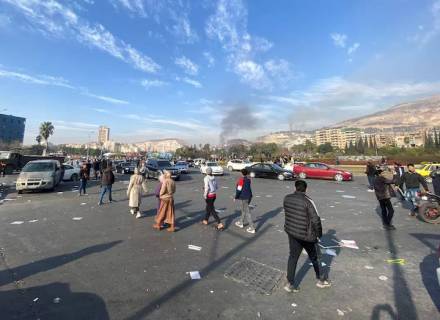India’s response to the rapidly changing situation in Syria has been one of caution and concern. With reports suggesting that rebel forces are gaining ground against Bashar al-Assad’s government, India has expressed its worries about the potential fallout.
On December 9, 2024, the Ministry of External Affairs (MEA) issued an official statement highlighting the need for all parties to work towards preserving Syria’s sovereignty. The statement stated, “We are monitoring the situation in Syria in the light of ongoing developments. We underline the need for all parties to work towards preserving the unity, sovereignty, and territorial integrity of Syria.” Furthermore, India has reiterated its call for a “peaceful and inclusive Syrian-led political process respecting the interests and aspirations of all sections of Syrian society.”
India’s cautious stance reflects the deep stakes it has in Syria, from maintaining political relations to ensuring the safety of its citizens and countering security risks that may arise from a destabilized region.
India’s Historic Support for Syria
India and Syria have shared a long history of diplomatic engagement, founded on mutual respect for sovereignty and non-interference. Syria has been one of the few Arab nations to consistently support India on critical issues, especially Kashmir. While many countries in the region have sided with Pakistan, Syria has been a staunch advocate of India’s position, particularly in international forums.
In 2016, Syria’s Ambassador to India, Riad Abbas, affirmed Syria’s unwavering position on Kashmir, stating, “Anyone who raises a weapon against the government, we call them terrorists, and the government must take action against them.” This alignment has played a crucial role in fostering a robust bilateral relationship. Syria’s backing has been particularly important in the wake of India’s decisions regarding Jammu and Kashmir, such as the revocation of Article 370 in 2019. Syria’s support, which framed these actions as India’s “internal matter,” reinforced the trust between the two nations.
Economic and Developmental Cooperation
India’s engagement with Syria has not been limited to diplomacy; economic and developmental cooperation has also been a cornerstone of the relationship. India has helped Syria in several critical areas, from infrastructure projects to providing lines of credit. For instance, India offered Syria a $240 million line of credit to build a power plant, and helped modernize the country’s steel industry. India’s contributions also extended to biotechnology, education, and agriculture.
During Prime Minister Atal Bihari Vajpayee’s 2003 visit to Syria, both nations signed memorandums of understanding (MOUs) to foster cooperation in several sectors, including biotechnology and small industries. In 2008, Syrian President Bashar al-Assad’s visit to India also paved the way for agreements in agriculture and IT, underscoring the strong economic ties between the two countries.
However, with Assad’s government now facing significant challenges, these developmental projects and economic partnerships are at risk. The potential collapse of the Assad regime raises doubts about the future of India’s investments in Syria, as political instability could derail ongoing and future projects.
Security Implications for India
The fall of the Assad government could have serious security implications for India. One of the most pressing concerns is the potential resurgence of extremist groups, including ISIS, which once had significant influence in the region. Syria, under Assad’s leadership and with the support of Russia and Iran, played a key role in combating these groups. The collapse of Assad’s regime could create a power vacuum, which might allow jihadist factions to regroup and further destabilize the region.
India has a history of countering terrorism and extremism that has connections to the Middle East, and a resurgence of ISIS or other radical groups could threaten Indian security. These groups could target Indian nationals and interests in the region, exacerbating an already precarious security situation. The Ministry of External Affairs has underscored the importance of preserving Syria’s unity and territorial integrity, as any fragmentation could embolden extremist factions.
The Safety of Indian Nationals in Syria
Another significant concern for India is the safety of its citizens in Syria. There is a sizable Indian community working in the Middle East, including in Syria. In response to the escalating violence, the Indian government issued a travel advisory, urging Indians to avoid traveling to Syria and advising those already in the country to exercise “utmost precaution.” The MEA also urged nationals to “restrict their movements to the minimum” and, where possible, to leave Syria on the earliest available commercial flights.
The safety of Indian nationals remains a priority, and the Ministry of External Affairs has stated that the Indian Embassy in Damascus is in contact with the local Indian community to ensure their well-being. As the conflict intensifies, India may have to ramp up its evacuation efforts, as well as provide humanitarian assistance to those in need.
Changing Geopolitical Dynamics
The fall of Bashar al-Assad’s government would likely result in a shift in Syria’s foreign policy and its alliances. Syria has historically maintained strong ties with Russia and Iran, two countries that are also key strategic partners for India. The potential collapse of Assad’s government could affect India’s relations with these regional players, leading to a reconfiguration of India’s Middle East strategy.
India has traditionally balanced its relationships with various countries in the Middle East, including Gulf nations, Iran, and Israel. A change in Syria’s political landscape could make it more difficult for India to navigate these complex relations, particularly if Syria’s alliances shift toward powers that do not align with India’s interests.
A Delicate Balancing Act
As India monitors the situation in Syria, it finds itself in a delicate position. While India’s support for a Syrian-led resolution to the conflict remains firm, the potential collapse of the Assad regime could undermine India’s long-standing relationship with Syria. Beyond the diplomatic ties, the loss of stability in Syria threatens to affect India’s security interests, economic projects, and humanitarian obligations.
